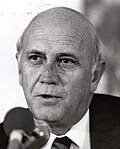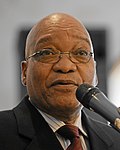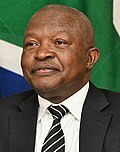| Deputy President of the Republic of South Africa | |
|---|---|
10 other official names
| |
| Style | Mr. Deputy President (informal) His Excellency (formal, diplomatic) |
| Type | Deputy to the Head of State and Head of Government |
| Abbreviation | DP |
| Member of | Cabinet National Assembly |
| Reports to | The President |
| Residence | Oliver Tambo House (Pretoria) Highstead (Cape Town) Dr. John L. Dube House (Durban) |
| Appointer | President |
| Term length | No term limit |
| Inaugural holder | F. W. De Klerk |
| Formation | 10 May 1994 |
| Salary | R3 million |
| Website | www |
| Part of a series on the |
| Politics of South Africa |
|---|
 |
The deputy presidentof South Africa is the second highest ranking officer of the executive branch of the Government of South Africa. The deputy president is a member of the National Assembly and the Cabinet.
Contents
- Inception and expiry of term
- Informal roles
- Deputy presidents of South Africa (1994–present)
- Timeline
- See also
- References
The deputy president is constitutionally required to "assist the president in the execution of the functions of government", and may be assigned any government portfolio by presidential proclamation.
The deputy president performs the duties of the president when the president is outside the country's borders, unable to fulfill the duties of the office, or when the presidency is vacant.
The deputy president is generally appointed as the leader of government business in the Parliament of South Africa by the president.
Under the interim constitution (valid from 1994 to 1996), there was a Government of National Unity, in which a member of parliament from the largest opposition party was entitled to a position as deputy president. Along with Mbeki, the previous state president, F. W. de Klerk, also served as deputy president in his capacity as the leader of the National Party, then the second-largest party in the new parliament. De Klerk later resigned and went into opposition with his party. A voluntary coalition government continues to exist under the new constitution (adopted in 1996), although there have been no appointments of opposition politicians to the post of deputy president.
The official living residences of the deputy president are Oliver Tambo House in Pretoria, Highstead, in Cape Town and Dr John L Dube House in Durban.










